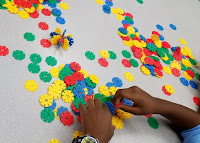Wednesday, September 20, 2017
Color Equations
1st grade students used cherry, lemonade, and blue raspberry Kool-Aid to perform mixing experiments to confirm that yellow and blue make green, red and yellow make orange, and blue and red create purple. Then students documented their experiments filling out color equations sheets.
Colored Mice
2nd grade students review the primary and secondary colors and created a project based off the book Mouse Paint by Ellen Stoll Walsh. First students glued together a red, yellow and blue primary colored background. Then they cut out green, purple, and orange secondary mice. To complete their project they added brown ears and tails followed by drawing on eyes and whiskers.
I Know My Colors
1st graders reviewed eleven colors and completed a I Know My Colors sheet to show their comprehension.
Painted Tubes: Part 1
3rd, 4th, and 5th graders are working on recreating a collaborative project for our school building. First students painted a cardboard paper towel tube white, next they drew out their designs for decorating their tube, and then using crayons students starting drawing directly on their tube. This project is still ongoing and once it’s complete for all 3rd, 4th, and 5th grade classrooms; I will install it and post additional pictures.
Primary Crayons
Kindergartens learned about the three primary colors: red, yellow and blue. They colored one crayon red, one crayon yellow, and one crayon blue. Then students cut each crayon out practicing scissor control and glued them onto black paper.
Scribble Monsters
During the first day of art, 1st and 2nd graders used a crayon to scribble a mark onto a piece of paper. White paint was added for eyes and allowed to dry. Then students painted black eyeballs, mouths, arms and legs to complete their monster.
Kindergarten Art
Depending on the lesson and project, students may rotate to different table groups during art class. This allow me to focus more attention to a smaller group of children while still monitoring the overall classroom environment.
Some activities at table groups may include:
Some activities at table groups may include:
- Building, spelling or creating color patterns individually or with a partner using foam blocks.
- Building, sorting, counting or creating color patterns using connects.
- Drawing using crayons, markers or stencils.
- Reading or examining pictures in theme related books.
- From the pictures below, my focal table group was with safety and using scissor control.
Tuesday, September 19, 2017
Art Room Expectations
 I address my Art Room Expectations during the 2 week of school. The first art class usually consist of an introduction about myself and my family, acknowledging any new faces to Jamestown, and welcoming back familiar ones. Then we usual get right to work on collaborative projects.
I address my Art Room Expectations during the 2 week of school. The first art class usually consist of an introduction about myself and my family, acknowledging any new faces to Jamestown, and welcoming back familiar ones. Then we usual get right to work on collaborative projects. My Art Room Expectations are to:
1. Enter Quietly
2. Listen and Follow Directions
3. Raise Your Hand
4. Good Attitude
5. Cooperative Cleanup
6. Line Up Quietly
I discussed my expectations in detail with each 1st-5th grade class and refer to the pictures located on a bulletin board in my room when reminders are needed.
Subscribe to:
Comments (Atom)
















































